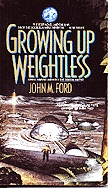
| Publisher: | Bantam |
| Copyright: | November 1993 |
| Printing: | August 1994 |
| ISBN: | 0-553-56814-0 |
| Format: | Mass market |
| Pages: | 261 |
Growing Up Weightless is the story of a boy growing up on an independent Luna (pronounced with a short u, and only Slammers, Earth inhabitants, call it the Moon). He has a tense relationship with his father, a high-ranking member of the Luna government deeply involved in the ongoing tension between Earth and Luna over water and who is widely admired and respected by everyone. More than anything else, he wants to get away from the ever-present shadow of Earth, get a position on a spaceship, and get out from under the shadow of his father.
All the material for a typical SF bildungsroman is there, and after the first few dozen pages, I was carrying quite a few expectations. Matt would prove himself, do something dramatic that resolved or exploded the political situation, find his new place in the world, and become an important citizen of Luna or maybe become important in the interstellar culture of starships. None of that happened. For much of the book, I thought it was just developing slowly, but Ford then resolves the story in an emotional direction that isn't traditional and was startlingly effective.
This story is initially told from Matt's perspective and follows a slice of his life. He has a group of close friends with whom he plays roleplaying games (using some sort of virtual reality), he wanders the dome of his city and hates the Earth tourists, and he resents his father. There's nothing precisely bad about his father, except that he's very important, everyone looks up to him, he has a way of getting his way and pushing Matt into a particular life, and Matt feels stifled. Some of this slice of life portrayal is engrossing; I found myself drawn into the relationship dynamics among Matt's circle of friends, for instance. Some is annoying, such as the constant slang (the Russian worked after a while but the made-up English struck my ear wrong) and the persistent use of thousands of hours instead of years for giving longer lengths of time.
After a bit, Ford starts switching between Matt's perspective and that of his father (using unusual transitions that don't happen during scene cuts, although only one of those really felt clunky). More complexity shows up here. It becomes immediately obvious that Matt's father is one of the good guys but is fighting some difficult political fights. The economic situation of Luna is precarious, and the Earth corporations aren't easy to deal with. I thought this was going to become the main plot of the book, but it ends up being only a sidelight.
The transformation that Ford pulls off, halfway through or later in this book, is that these two themes coalesce emotionally rather than around a plot. No traditional SF plot ever materializes. Matt and his friends go on an adventure, but it's unconnected with anything else. His only involvement in his father's political world is ancillary and accidental. But over the course of that adventure, his abstract dislike of Luna confronts his feelings for his social connections and his friends, the surface peels off his relationships to reveal startling depths, and the conclusion strikes a beautiful bittersweet chord of emotion that captures a moment of maturation. None of his friends turn out to have deep secrets. Quirky kids, defying reader expectations, turn out to just be quirky kids. His father isn't an ogre, and at the same time his father has to confront how much he cares for his son, without any dramatic moment of danger.
This is, in short, a book that feels pedestrian for about 150 pages, and then reveals that it was building up for an emotional climax that doesn't follow any of the normal plot ruts. The depth of emotion comes from an unexpected angle and gains effectiveness by it. The whole book was made for me in the last 20 pages, in several scenes that are startling in their acuity of vision. "There are two kinds of people who laugh at Polonius advising his son: those who've played him and those who aren't yet aware they've played him." Indeed.
John M. Ford very recently died. Many people who knew him or have read far more of his work than I have posted many moving tributes; this review is my small contribution. He is probably best-known for his reinvention of Klingons in a couple of well-respected Star Trek novels, but he had a remarkable range (including some amazing poetry). I can certainly recommend this quiet character novel.
Reviewed: 2006-10-01